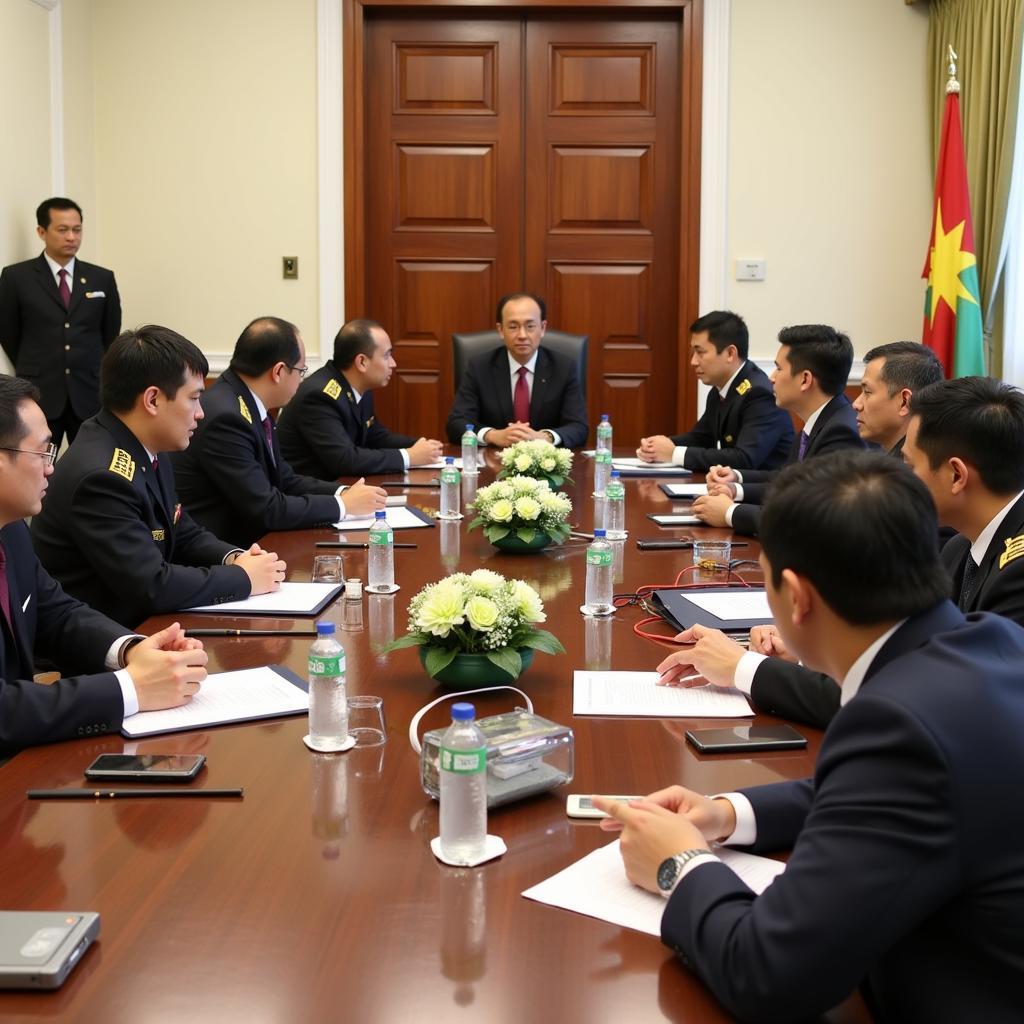The Asean 5-point Consensus has become a cornerstone of the regional bloc’s approach to the crisis in Myanmar. This agreement, reached in April 2021, outlines a framework for dialogue, humanitarian aid, and a peaceful resolution to the ongoing conflict. asean 5 point consensus on myanmar But how effective has it been, and what challenges lie ahead? This article delves into the intricacies of the ASEAN 5-Point Consensus, exploring its impact and the complexities of implementing it in a volatile political landscape.
Understanding the Core of the ASEAN 5-Point Consensus
The consensus comprises five key points: an immediate cessation of violence, constructive dialogue among all parties, the appointment of a special envoy of the ASEAN Chair to facilitate mediation, the provision of humanitarian assistance coordinated by ASEAN, and the visit of the special envoy and delegation to Myanmar to meet with all parties involved. These points represent a coordinated effort to address the multi-faceted crisis, prioritizing dialogue and humanitarian relief.
The Challenges of Implementation: A Rocky Road to Peace
While the ASEAN 5-Point Consensus offers a roadmap for peace, its implementation has faced significant hurdles. The ongoing violence, lack of trust between stakeholders, and restricted access for humanitarian aid have hampered progress. Moreover, the military junta’s reluctance to fully cooperate with ASEAN has created a stalemate, raising questions about the effectiveness of the consensus. What is the ASEAN 5 Point Consensus and why is it so crucial? It represents a unified regional response, crucial for maintaining stability and demonstrating ASEAN’s commitment to peaceful conflict resolution.
Navigating the Political Landscape: Diplomacy and Dialogue
The political landscape in Myanmar is complex, making the task of mediating between opposing factions extremely challenging. ASEAN’s special envoy has undertaken several missions to Myanmar, but tangible results remain elusive. Building trust and fostering genuine dialogue between the military, the National Unity Government, and ethnic armed organizations is essential for moving forward. asean 5 point consensus This intricate situation demands sustained diplomatic efforts and innovative approaches to bridge the divide and pave the way for a more inclusive political process.
 ASEAN Special Envoy meeting with stakeholders in Myanmar
ASEAN Special Envoy meeting with stakeholders in Myanmar
The Humanitarian Imperative: Delivering Aid Amidst Conflict
The humanitarian crisis in Myanmar has worsened since the coup, with millions in need of assistance. Delivering aid effectively requires navigating complex logistical challenges and securing access to conflict-affected areas. ASEAN’s coordinating role is crucial in ensuring that aid reaches those most in need, while also upholding humanitarian principles of impartiality and neutrality. asean 5-point consensus myanmar How is humanitarian aid being delivered in Myanmar? It’s a complex process involving coordination with local organizations and navigating difficult terrain, highlighting the importance of ASEAN’s role.
Assessing the Impact: Measuring Progress and Identifying Gaps
Evaluating the effectiveness of the ASEAN 5-Point Consensus requires a nuanced approach. While progress has been slow, the consensus remains the most viable framework for addressing the crisis. Regular assessments, coupled with open dialogue among ASEAN member states, are essential for adapting strategies and overcoming challenges. Furthermore, exploring complementary approaches, such as engaging with other international actors, could strengthen ASEAN’s efforts and enhance the chances of achieving a lasting solution.
“The ASEAN 5-Point Consensus is not a silver bullet, but it is the best tool we have. It requires unwavering commitment from all parties involved, as well as flexibility and adaptability in the face of evolving circumstances.” – Dr. Anisa Ahmad, Southeast Asian political analyst.
“The humanitarian situation in Myanmar is dire, and access remains a significant obstacle. ASEAN’s role in coordinating aid is paramount, but more needs to be done to ensure that aid reaches the most vulnerable populations.” – David Lee, Humanitarian Aid Coordinator.
Looking Ahead: The Future of the ASEAN 5-Point Consensus
The ASEAN 5-Point Consensus represents a critical juncture in the regional response to the Myanmar crisis. ase what is Its success hinges on the collective will of ASEAN member states, the cooperation of the military junta, and the active participation of all stakeholders. Moving forward, strengthening ASEAN’s capacity for mediation, enhancing humanitarian access, and fostering inclusive dialogue are vital steps toward achieving a peaceful and sustainable resolution in Myanmar. 5 point consensus asean The ASEAN 5-Point Consensus stands as a testament to the region’s commitment to dialogue and peaceful resolution. The future of Myanmar depends on the continued commitment of all parties to uphold the principles of this agreement.
FAQ
-
What is the ASEAN 5-Point Consensus? It’s a five-point plan agreed upon by ASEAN leaders to address the crisis in Myanmar.
-
What are the key elements of the consensus? They include ending violence, dialogue, a special envoy, humanitarian aid, and a visit to Myanmar.
-
Why is it important? It provides a framework for resolving the crisis and promoting stability in the region.
-
What are the challenges? Implementation has been hampered by ongoing violence and lack of cooperation.
-
What is the future of the consensus? Its success depends on continued commitment and adaptation to the evolving situation.
-
How can I stay informed about developments? Follow reputable news sources and ASEAN official statements.
-
What role does ASEAN play in humanitarian aid? ASEAN coordinates the delivery of humanitarian assistance to those in need.
Need more information? Check out these related articles on our website:
For assistance, please contact us at: Phone: 0369020373, Email: aseanmediadirectory@gmail.com or visit us at: Thôn Ngọc Liễn, Hiệp Hòa, Bắc Giang, Việt Nam. Our customer service team is available 24/7.
